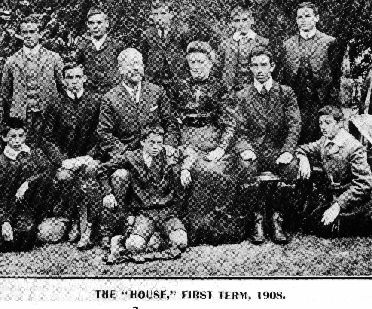EDITORIAL
Britain is at war! Every part of the nation in represented in the fight; and naturally, all British schools think that they, in spirit at least, are engaged in the struggle. Such a thought is by no means foolish, for to the influence exerted by the school can be traced in many of the admirable qualities of the British soldier.
In school life, sport supplies the outlet for physical energy, and develops qualities both physical and mental. On the playground, Muscle, speed, and health are gained. Knocks are given and taken with equal good-humour. Perseverance, unity and obedience must be practised before success can be attained. Lastly, in the majority of cases, play among school-boys is clean and fair.
In the trenches, what characterises the British soldier? Private Atkins is popularly considered a hardy customer. He endures, with equanimity, all the privations of a rough life. Obedient to the call of duty, he braves any danger. He has entered the conflict, determined to conquer, and determined at the same time to get as much fun as he can from his daily routine. If wounded, he hides his pain with a jest. Under the most trying conditions, Tommy maintains a mixture of stubborn courage, dogged endurance, and grim humor, which form an admirable fighting combination.
The British officer gains favor in the eyes of his men, by trying to make the life pleasant, healthy, and well cared for. The commander, having brought his men up to the pitch of martial excellence, expects them to emulate the deeds of their forefathers. In all emergencies, he sets a noble example. Thus, in spite of great hardships, all classes of men are knit together, in the trenches, by the bond of good-fellowship.
Now, where is it that the British Army has gained its esprit de corps? Whence have the soldiers obtained their individual and collective merit? At camp, certainly, they have learnt precision and strict obedience; while the justice of their cause has convinced them of ultimate victory. But it must be remembered that the present British army has not passed its life in barracks. Kitchen's volunteer army includes a large percentage of men who once attended secondary schools. It is the training such men received au school that has created the spirit and efficiency of the Army. The qualities which the soldier now displays in the trenches, were first developed on the playground. If games can have such a lasting influence, can mean so much to the nation, then certainly games are of the utmost importance in school life.
School-fellows! Learn on the playground to conquer self, to master quick-temper and laziness; develop your character and resource by indulging whole-heartedly in school sport; then later, you will serve your country, if not as soldiers, at least as responsible citizens. Remember Wellington's saying, " The battle of Waterloo was won on the playing-fields of Eton."
L.L., Palmerston North Boys' High School, 1915
1945-1959 THE TITHERIPGE YEARS
The Principal: Mr. L.E. Titheridge recorded: 6th February 1945, 550 students and twenty-one teachers gathered with mixed feelings of excitement, trepidation and expectancy to share that task of turning the hospital into a school...Avondale Technical High School...1945 will go down in the annals of history as one of the important years of all time. The ending of the war in Europe and the Pacific...the threshold of a new era marked by a new national school curriculum...the school motto Kohia Nga Taikaka founded... 'emu parades': large lines of students bent over picking up stones from the new playing fields...the establishment of the nationwide renowned orchestra with Mr. Gordon Cole.

My Snazzy List of Links
- More History
- Additonal historical views of New Zealand education
- New Zealand Schools Home Page
- Return to Apertures New Zealand schools home page